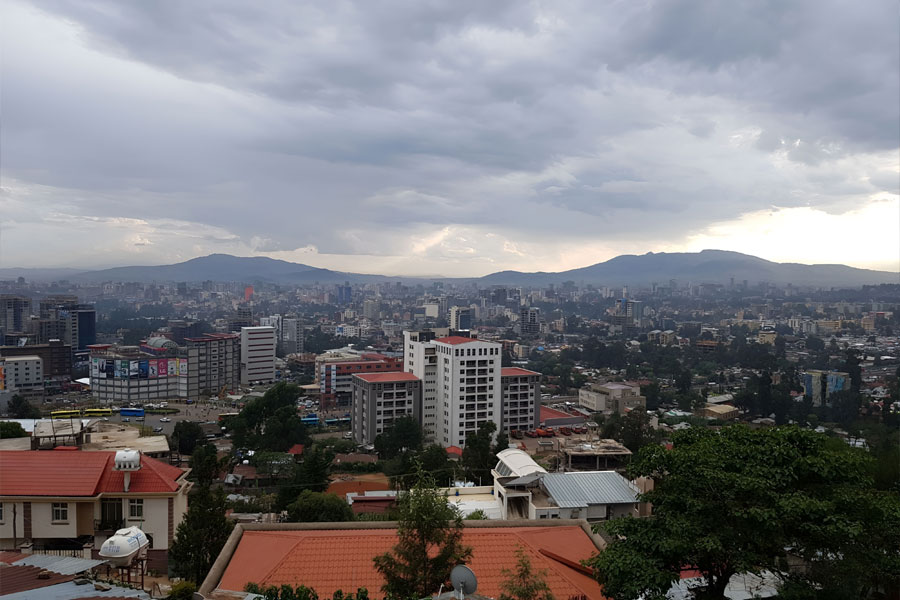
Jan 19 , 2024
By Senay Lemma
Ethiopia's current economic crisis, marked by hyperinflation and stagflation, requires a manifold approach. Addressing the root causes of internal conflicts is the first critical step. Once stability is achieved, the government must implement comprehensive strategies, including supporting employers, improving foreign exchange availability, diversifying the economy, and attracting foreign investment, writes Senay Lemma (senaylemma2@gmail.com).
In recent years, Ethiopia has been under the spell of dual economic scourges of hyperinflation and stagflation. These twin crises, manifesting in soaring prices and sluggish economic activities, are eroding the country's socio-economic fabric and destabilising its political life. With a year-on-year (YoY) inflation rate surging past 30pc over the last two years, Ethiopia finds itself in a precarious position, facing crises that threaten its stability and growth prospects.
The impact of hyperinflation is most acutely felt in the daily lives of Ethiopians. The cost of living has sky-rocketed, primarily driven by significant increases in the prices of necessities such as food and shelter. These escalating costs are becoming increasingly unbearable for the average household, with many struggling to fend off hunger.
These inflationary pressures have placed Ethiopia among the top 10 countries globally and the top three in Africa for inflation rates, imperilling its economic growth and financial system stability. The private sector, a driver of economic activities, is reeling under rising raw material costs and foreign exchange shortages. Over the last few years, nearly 500 businesses have shut down, exacerbated by the war in the north and the scarcity of foreign exchange rates. This wave of closures has not only slowed economic activity but has also led to increased unemployment.
The federal government, too, faces an uphill battle against hyperinflation and stagflation. Confronted with a severe fiscal deficit, it has announced a freeze on new public service jobs. Given that the government employs about 20pc of the labour force, this decision will likely worsen unemployment statistics, particularly among recent graduates. Severe budget shortages and a foreign exchange crisis have hamstrung the government's ability to provide essential public services, further contributing to the cycle of business closures and economic stagnation.
The causes of the economic woes are manifold, stemming from a mix of global and domestic factors. The global context, particularly the conflict in Ukraine, has exacerbated these domestic problems, driving up global fuel and food prices.
The war broke out in Tigray Regional State, with its economic losses estimated at six billion dollars and damages of over 20 billion dollars, stands out as a primary contributor. The war has damaged the country's relations with donor countries, traditionally a source of aid and investment. The strained relations, coupled with the effects of the COVID-19 pandemic, have exerted additional pressure on the exchange rate, fueling inflation.
The conflicts unfolding in the Amhara and Oromia regional states have further disrupted agriculture and transport, leading to shortages of essential goods and spiking prices.
The federal government's macroeconomic policies have also played a role in aggravating inflation. In response to reduced aid, investment, and trade flows, the central bank has resorted to printing more money to finance the federal budget. In a stagnating economy, expansion in money supply has inevitably led to higher inflation and further depreciation of the Birr. The government's decision to remove fuel subsidies, though aimed at easing the burden on public finance, inadvertently caused fuel prices to spike, leading to higher transportation costs and further inflation across various sectors.
Since December 2021, fuel prices have more than doubled, further exacerbating the cost of living and fueling higher inflation. The price of petrol has risen by 189pc, and diesel by 231pc. This spike in fuel costs has had a cascading effect on the prices of major food commodities, which constitute over half of a household's expenses. During the same period, the price of 100gm of bread quadrupled from 2.50 Br, and a quintal of teff, a staple grain, saw a nearly fivefold increase to 12,000 Br. A kilogram of onion and a litre of oil, staples in the diet, have seen their prices quadruple and nearly quadruple, respectively.
Ethiopia's situation contrasts with global trends of declining inflation rates in 2023, suggesting a rough path ahead. The inability to sustainably reduce inflation to single digits indicates that the worst may still be in the offing. Taming inflation in the short term remains a formidable challenge due to factors beyond policymakers' immediate control.
The prospects for a swift resolution to the economic crisis appear dim. The goal set by Central Bank Governor Mamo Miheretu to contain inflation in a single digit by mid-2024 seems increasingly unattainable unless the country addresses its complex economic and political contradictions. Unless resolved, the ongoing conflict in Ukraine and internal strife in Oromia and Amhara are likely to continue impeding foreign investment and tourism, key drivers of economic revival. A further devaluation of the Birr is projected, which would only aggravate the current crises.
The uncertain peace and stability are bound to complicate the economic recovery further.
Policymakers must address the root causes of internal conflicts, which have had catastrophic consequences for the country. Halting these conflicts and creating a stable political environment is essential for attracting foreign investors and revitalising the economy. Once peace is achieved, the government should focus on creating a business-friendly environment, reducing bureaucracy, combating corruption, and upholding the rule of law to boost investor confidence and sustainable development.
Halting the war would also positively impact official development assistance (ODA), which has sharply declined due to the ongoing conflicts. Restoring donors' confidence would be crucial for securing the financial support needed for recovery and reconstruction, indirectly responding to hyperinflation and stagflation. Policymakers can fight further fuel price hikes and maintain fuel subsidies to prevent exacerbating the situation.
The severe shortage of foreign currency is forcing major manufacturers to scale back production, leading to job losses and reduced productivity. Broadening the foreign exchange reserve is essential for businesses to operate at full capacity, hire more, and contribute to the import substitution strategy. With imports significantly outstripping exports, there is an urgent need to reduce dependence on a few industries and encourage growth in sectors such as agriculture, manufacturing, and technology. This diversification would create a more resilient economy, less susceptible to inflation and unemployment.
Extravagant spending on non-impactful initiatives should be curtailed. The government should focus its resources on measures that directly alleviate stagflation or create jobs. Introducing minimum wages as the International Labour Organization (ILO) and the Confederation of Ethiopian Trade Unions called for lower-paid workers, particularly in industrial parks, will be helpful. Revising the current tax bracket to alleviate the burden on low-income earners is necessary.
Employers have a role to play in supporting their employees during these challenging times. Despite the constraints they face, financially stable employers can aid their staff by providing emergency loans, revising salary scales, offering performance and retention bonuses, and implementing financial literacy and well-being programs. Providing subsidised or free meals in the manufacturing sector can significantly motivate and retain staff.
PUBLISHED ON
Jan 19,2024 [ VOL
24 , NO
1238]


Editorial | Jul 22,2023

Commentaries | Jan 07,2023

Editorial | Jul 08,2023

Agenda | Oct 14,2023

Agenda | Oct 15,2022

Fortune News | Jun 11,2022

Commentaries | Jul 27,2024

Editorial | Aug 20,2022

Commentaries | Apr 17,2021

Radar | Jun 24,2023

My Opinion | 131658 Views | Aug 14,2021

My Opinion | 128022 Views | Aug 21,2021

My Opinion | 125985 Views | Sep 10,2021

My Opinion | 123609 Views | Aug 07,2021

Dec 22 , 2024 . By TIZITA SHEWAFERAW
Charged with transforming colossal state-owned enterprises into modern and competitiv...

Aug 18 , 2024 . By AKSAH ITALO
Although predictable Yonas Zerihun's job in the ride-hailing service is not immune to...

Jul 28 , 2024 . By TIZITA SHEWAFERAW
Unhabitual, perhaps too many, Samuel Gebreyohannes, 38, used to occasionally enjoy a couple of beers at breakfast. However, he recently swit...

Jul 13 , 2024 . By AKSAH ITALO
Investors who rely on tractors, trucks, and field vehicles for commuting, transporting commodities, and f...

Jun 28 , 2025
Meseret Damtie, the assertive auditor general, has never been shy about naming names...

Jun 21 , 2025
A well-worn adage says, “Budget is not destiny, but it is direction.” Examining t...

Jun 14 , 2025
Yet again, the Horn of Africa is bracing for trouble. A region already frayed by wars...

Jun 7 , 2025
Few promises shine brighter in Addis Abeba than the pledge of a roof for every family...

Jun 29 , 2025
Addis Abeba's first rains have coincided with a sweeping rise in private school tuition, prompting the city's education...

Jun 29 , 2025 . By BEZAWIT HULUAGER
Central Bank Governor Mamo Mihretu claimed a bold reconfiguration of monetary policy...

Jun 29 , 2025 . By BEZAWIT HULUAGER
The federal government is betting on a sweeping overhaul of the driver licensing regi...

Jun 29 , 2025 . By NAHOM AYELE
Gadaa Bank has listed 1.2 million shares on the Ethiopian Securities Exchange (ESX),...